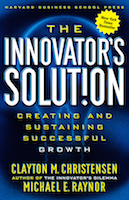 The Innovator's Solution by Clayton Christensen
The Innovator's Solution by Clayton Christensen
Many of the most valuable and notable companies in the U.S. can attribute their greatness in large part to reconceiving a market’s boundaries. From Wal-Mart to Apple, these organizations expanded markets that others have written off as fixed. What can be learned from their revolutionary approach to breaking into new markets?
Back in 2003, in the book, “The Innovator’s Solution” author Clayton M. Christensen presented the rather simple but profound idea of trying to help people address their “jobs to-be done” rather than selling their products and services to their customers. From here, an entire “jobs to be done” framework emerged as a helpful way to look at customer needs and motivations in business settings. As a marketing and advertising agency, we’ve begun baking in this framework as just one tool in our strategy offering and found that a further introduction to these principals might be useful to our readers as well as our current clients.
To better illustrate, I thought I’d interview our Senior Strategist, Matt Gunson on his understanding and application of this instrument.
Scott McAndrew: In brief, what is Jobs to be Done (JTBD)?
Matt Gunson: It’s the idea that when a customer buys a product they are “hiring” it to do a “job” for them, and that the job arises due to a unique set of circumstances. It’s an empathic approach to analyzing consumer choices.
McAndrew: Who created Jobs to be Done (JTBD)?
Gunson: It has its roots in Clayton Christensen’s Disruption Theory. Christensen mentions it in his 2003 book, The Innovator’s Solution using this example about a Milkshake. The “colleague” referenced in that vignette is Bob Moesta of the Rewired Group. He has been applying this method for almost 20 years but it has only been in the last few years that it has been explained, taught and implemented by a broader group of practitioners.
McAndrew: Can you give me a real-world example of Jobs to Be Done (JTBD)?
Gunson:I read a good one recently on Samuel Hulick’s blog User Onboarding. He interviewed Ryan Singer of 37signals who used the example of ordering Pizza vs. going out to Italian food. He explained it like this:
Situation 1: It’s Friday night I’m exhausted from a long week of work and it’s too cold to go out. Getting pizza delivered sounds like a great idea.
Situation 2: It’s Friday night, I’m going on my third date, where can we go for a nice Italian dinner?
Both situations are driven by a completely different set of circumstances that result in a purchase or “hire.” In neither circumstance does a person’s attributes dictate causation. So a 30 year old male might order delivery pizza one night and might choose going out to Italian food another night because of the distinct circumstances around each event. Attributes alone can’t explain causation – only correlation.
McAndrew: Some aspects of JTBD sound similar to segmentation and personas. Is JTBD a replacement for segmentation and/or personas?
Gunson: The Pizza example shows that attributes, which are the focus of personas and most segmentation exercises, don’t account for causation. In marketing however because media is more easily sold (and has always been sold) primarily based on targeting attributes, many times JTBD is used together with personas and/or traditional segmentations. However where budgets of either time or money can’t accommodate multiple layers of research, many practitioners will use JTBD as a stand-alone solution.
McAndrew: What potential applications does JTBD have for marketing?
Gunson: Here at LaneTerralever we’re looking at it as an additional tool in our toolbox that provides a different lens to look through as we create strategy from consumer level insights to guide design, development and content. I think content is a huge area for application. Because what comes out of these interviews are first hand statements about the circumstances that prompted a purchase there is so much content to draw from. In the case of Pizza vs. Italian, we can speak to each job uniquely. It can also be used to guide decisions about when to run media/content and how much.
McAndrew: What groups here at LT are evaluating JTBD?
Gunson: A few teams at LaneTerralever are following how our Strategy Group is using Jobs to be Done and evaluating it for their specific needs. The user experience and content marketing teams are the two most interested teams.
McAndrew: Where is the best place to learn more about JTBD?
Gunson: Jobstobedone.org is a great place for reading blog posts and listening to podcasts from Bob Moesta and Chris Spiek. And because it is such a cutting edge theory up to the moment thoughts, ideas, and links to articles can be found by following the #jtbd hashtag on twitter as well as on Quora. There are also rumors of a forthcoming book on JTBD by Clayton Christensen himself. I'm looking forward to that one.




